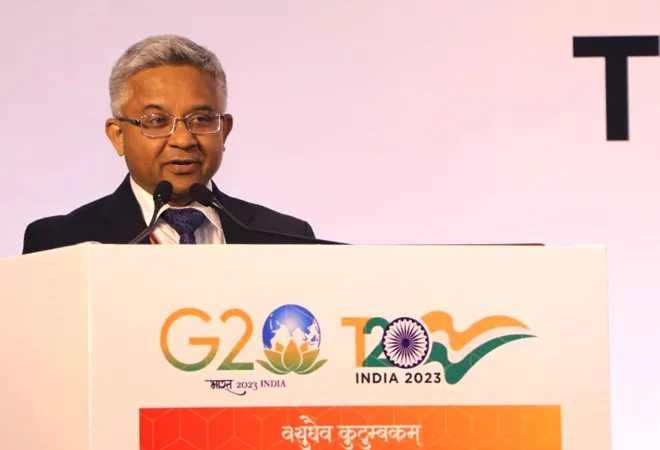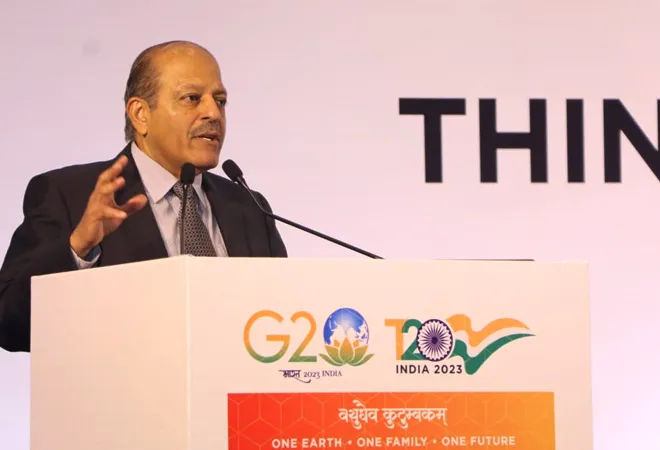Amb. Sujan R. Chinoy, Chair, T20 India Core Group; Chair, T20 Task Force 3 and 7; and Director General, MP-IDSAdelivered the Welcome Remarks on day two of the Think20 India Inception Conference. He highlighted how all the factors and vectors of the global world are under challenge, with a special mention of the 6Ts—Trade, Technology, Tenets, Terrorism, lack of Trust, and Territory. He reiterated how Prime Minister NarendraModi soughtthe G20 to beaction-oriented and ambitious, and congratulated everyone whowereinvolved in the efforts to make that happen.
He further pointed out that even though organisations like theWHO and the WTO are weakened by the politics of trade and global pandemic, the G20 aspires to work with them to bring out sustainable solutions. Lastly, he highlighted the unique featuresof India’s Think20 groups, such as working actively with all other engagement groups that are geographically diverse and gender inclusive, being actively in touch with T7 and Japan, and cooperating with global think tanks. He stated that India will keep generating new ideas and giving voice to the Global South during the course of itsPresidency. He concluded by emphasising on the need for human-centricand values-based approach to globalisation as India is on a pathway to create a new moral compass for the global world.

Amb. Abhay Thakur, Sous Sherpa, G20 India began his address by highlightingthat India’sG20 Presidency comes at a time of several challenges, such as climate change, lack of progress in SDGs, and economic and food insecurity. He emphasised the role of G20 insolving these challenges. He reiterated PM’s vision for the grouping to be ambitious, target and action oriented. Talking about the G20 logo and theme, he said the Earth reflects a pro-planetapproach, and the lotus represents growth amid challenges. The theme ‘VasudhaivaKutumbakam’ signifies the essence of one world, one family, and one future. Based on the principles of the Maha Upanishad, the theme and logo represent the idea of inclusivityfor all life forms and their interconnectedness. He went on to state that being the fastest-growing economy in a gloomy scenario, India has the potential for delivering quality solutions. As a member of the G7, G20, Quad, SAARC, and others, India canbridgethe gap between developed and developing nations.
He added that nine countries and 14 organisationswereinvited in addition to the G20 nations, making this the largest-ever participation in any Presidency. Amb. Thakur continued that the criticalpriority conversations at the G20 will revolve around Mission LiFE, climate action and SDGs, mobilisation of adequate resources, and finance for green transition, green energy, and development. He also drew focus on efficient renewable fuels and green hydrogen initiatives for achievable netzero targets. He added that there was a need for technological innovations and energy solutions to addressthe growing economic needs of countries like India and Africa.
He appreciated the Debt Service Suspension Initiative as one of the most significant achievements of the G20 in the Saudi Presidency and presented various challenges that the Indian Presidencywould aim to resolve. In the finance sector, he pointed out the need for reforming global debt and reducing the SDG finance gap. He also spoke about the challenges of tech transformation and harnessing, and the need for digital platforms assolutions for development in sectors like agriculture and health forthe global public good.He expressed the need to develop a common framework for Digital Public Infrastructure besides digital platforms.He stated that global organisations need to be more inclusive, and the focus needs to be drawn on women-led development for charting the path to prosperity and socio-economic development. He concluded by reinstating the concept of the Indian government towards the G20—JanBhagidaari or People’sPresidency.
Watch the full address here.
This event report was compiled by Gopalika Arora, Associate Fellow, ORF.
The views expressed above belong to the author(s). ORF research and analyses now available on Telegram! Click here to access our curated content — blogs, longforms and interviews.

 Amb. Abhay Thakur, Sous Sherpa, G20 India began his address by highlightingthat India’sG20 Presidency comes at a time of several challenges, such as climate change, lack of progress in SDGs, and economic and food insecurity. He emphasised the role of G20 insolving these challenges. He reiterated PM’s vision for the grouping to be ambitious, target and action oriented. Talking about the G20 logo and theme, he said the Earth reflects a pro-planetapproach, and the lotus represents growth amid challenges. The theme ‘VasudhaivaKutumbakam’ signifies the essence of one world, one family, and one future. Based on the principles of the Maha Upanishad, the theme and logo represent the idea of inclusivityfor all life forms and their interconnectedness. He went on to state that being the fastest-growing economy in a gloomy scenario, India has the potential for delivering quality solutions. As a member of the G7, G20, Quad, SAARC, and others, India canbridgethe gap between developed and developing nations.
He added that nine countries and 14 organisationswereinvited in addition to the G20 nations, making this the largest-ever participation in any Presidency. Amb. Thakur continued that the criticalpriority conversations at the G20 will revolve around Mission LiFE, climate action and SDGs, mobilisation of adequate resources, and finance for green transition, green energy, and development. He also drew focus on efficient renewable fuels and green hydrogen initiatives for achievable netzero targets. He added that there was a need for technological innovations and energy solutions to addressthe growing economic needs of countries like India and Africa.
He appreciated the Debt Service Suspension Initiative as one of the most significant achievements of the G20 in the Saudi Presidency and presented various challenges that the Indian Presidencywould aim to resolve. In the finance sector, he pointed out the need for reforming global debt and reducing the SDG finance gap. He also spoke about the challenges of tech transformation and harnessing, and the need for digital platforms assolutions for development in sectors like agriculture and health forthe global public good.He expressed the need to develop a common framework for Digital Public Infrastructure besides digital platforms.He stated that global organisations need to be more inclusive, and the focus needs to be drawn on women-led development for charting the path to prosperity and socio-economic development. He concluded by reinstating the concept of the Indian government towards the G20—JanBhagidaari or People’sPresidency.
Watch the full address here.
Amb. Abhay Thakur, Sous Sherpa, G20 India began his address by highlightingthat India’sG20 Presidency comes at a time of several challenges, such as climate change, lack of progress in SDGs, and economic and food insecurity. He emphasised the role of G20 insolving these challenges. He reiterated PM’s vision for the grouping to be ambitious, target and action oriented. Talking about the G20 logo and theme, he said the Earth reflects a pro-planetapproach, and the lotus represents growth amid challenges. The theme ‘VasudhaivaKutumbakam’ signifies the essence of one world, one family, and one future. Based on the principles of the Maha Upanishad, the theme and logo represent the idea of inclusivityfor all life forms and their interconnectedness. He went on to state that being the fastest-growing economy in a gloomy scenario, India has the potential for delivering quality solutions. As a member of the G7, G20, Quad, SAARC, and others, India canbridgethe gap between developed and developing nations.
He added that nine countries and 14 organisationswereinvited in addition to the G20 nations, making this the largest-ever participation in any Presidency. Amb. Thakur continued that the criticalpriority conversations at the G20 will revolve around Mission LiFE, climate action and SDGs, mobilisation of adequate resources, and finance for green transition, green energy, and development. He also drew focus on efficient renewable fuels and green hydrogen initiatives for achievable netzero targets. He added that there was a need for technological innovations and energy solutions to addressthe growing economic needs of countries like India and Africa.
He appreciated the Debt Service Suspension Initiative as one of the most significant achievements of the G20 in the Saudi Presidency and presented various challenges that the Indian Presidencywould aim to resolve. In the finance sector, he pointed out the need for reforming global debt and reducing the SDG finance gap. He also spoke about the challenges of tech transformation and harnessing, and the need for digital platforms assolutions for development in sectors like agriculture and health forthe global public good.He expressed the need to develop a common framework for Digital Public Infrastructure besides digital platforms.He stated that global organisations need to be more inclusive, and the focus needs to be drawn on women-led development for charting the path to prosperity and socio-economic development. He concluded by reinstating the concept of the Indian government towards the G20—JanBhagidaari or People’sPresidency.
Watch the full address here.